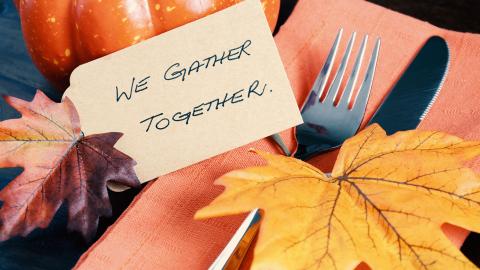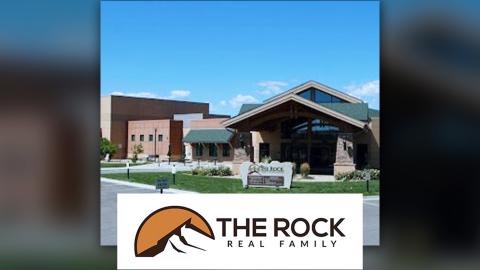
Unexpected Hospitality: Thanksgiving is a Time to Radically Love Those Unlike Us
COMMENTARY
The most authentic way to mark the 400th anniversary of the first Thanksgiving would be to welcome potentially overlooked guests.
The modern practice of Thanksgiving focuses primarily on gathering our family and inviting close friends to enjoy an overabundance of food. More spiritually-attentive gatherings may make time for each individual to share how God has blessed them in the past year. It is a celebration of our family and friends’ experience of sufficiency and plenty. It is a feast with people that we love and that we trust.
The first Thanksgiving was very different. As historian Robert Tracy McKenzie points out in his book, The First Thanksgiving, the meal brought together two communities – European Pilgrims and Native American Wampanoag – who lived in a potentially unstable truce with each other. Any meal between the two communities would be fraught. They experienced ongoing cultural misunderstandings and the ever-present fear of violence from each other.
Reluctant Hospitality
The Pilgrims were not welcome guests when they arrived. Had the Pilgrims arrived a few years earlier, before an epidemic reduced the Native American population by over 50%, the Wampanoag might have chosen to push the Pilgrims back into the sea, according to McKenzie. They had decades of experience with violence and enslavement by European voyagers.
However, though the Pilgrims may have been unwelcomed, the Wampanoag offered them crucial hospitality. They allowed Tisquantum, who had been enslaved by an English sea captain seven years before but who had escaped and returned, to teach the Pilgrims how to plant sustainable crops and to hunt and fish in their new surroundings. Half of the Pilgrims had died from disease and starvation during the prior year. The remainder likely would have died in the year to come without the Wampanoag’s hospitality, however cautiously it may have been offered.
The Pilgrims, in turn, were not predisposed to trust the Native Americans. In fact, two years after the first Thanksgiving, Wampanoag visitors would have seen the head of a member of the Massachusetts tribe attached to the Pilgrim’s fortifications.
The first Thanksgiving was far from a cozy reunion of long-term friends. McKenzie, a professor at Wheaton College, notes, “four centuries after the fact, we still don’t know for sure how the Wampanoag came to be there.” All we know from the contemporary account of Edward Brimslow is that the harvest festival featured “many of the Indians coming amongst us.” More than 90 of them, greatly outnumbering the 53 Pilgrims who had survived their first year.
If the first Thanksgiving was not a long-anticipated, warm reunion of family and friends, what happened that day? Undeserved hospitality begat unexpected hospitality.
Thanksgiving as an offering
Thanksgiving, properly understood, challenges us to rediscover the act of hospitality towards “the other.” How could we use the holiday to demonstrate radical hospitality to those we may feel uncomfortable around or threatened by? The writer of Hebrews challenges us in this regard: “Keep on loving each other as brothers and sisters. Don’t forget to show hospitality to strangers, for some who have done this have entertained angels without realizing it!” ( , NLT).
In his work, Reaching Out, Henri Nouwen speaks of it this way: “Hospitality means primarily the creation of free space where the stranger can enter and become a friend instead of an enemy. Hospitality is not to change people, but to offer them space where change can take place. It is not to bring men and women over to our side, but to offer freedom not disturbed by dividing lines.”
The biblical mandate given to us by Jesus to be kind and hospitable to our neighbors doesn’t have an agenda. “We love because he first loved us,” the Bible says ( ). We are never kind simply so that we can convert someone or corner them into a gospel conversation. We are kind because we are overflowing with thanksgiving in all that we have been given. Hospitality is an act of overwhelming thankfulness that cannot be hidden or squandered; we love because God first loved us.
Inviting in “the other”
Even though we do not offer hospitality just to witness, the act of hospitality is an act of witness, particularly to young adults disenchanted with Christianity. I work closely with college students at InterVarsity Christian Fellowship. Generation Z students overwhelming wonder why American Christians seem so fearful of those who are different than themselves. They see polls demonstrating the evangelicals express the highest rates of opposition to the arrival of refugees and immigrants. They watch many in the church continue to deny the existence of racial injustice. They wonder whether Christians will demonstrate the radical hospitality Jesus offered to people who were so thoroughly different than himself.
Let me suggest two groups of people who I believe Christ is calling us to embrace this Thanksgiving season.
- Refugees
The refugee crisis that resulted from the United States’ quick withdrawal from Afghanistan has heightened our awareness of the global refugee crisis. The global refugee population has more than doubled over the past decade. Due to the pandemic, the number of refugees globally increased by 4 percent in 2020, marking a record high of 82.4 million people. And the number grows by 44,000 daily.
While the vast majority of refugees remain overseas, many refugee families have come to the United States hoping to experience the freedom of religion and physical safety for their children. They also hope to find friendship and community. Individuals and churches should partner with ministries like World Relief to welcome refugees into Thanksgiving meals that could create found families for them – and for us.
- International students
Anyone who lives within driving distance of a college or university lives near an international student or scholar. Over one million of them are on our campuses. They study in the United States for a few years before they return to their countries of origin to lead businesses, government agencies, and institutions of higher education. They come for several years to receive an education, and they often leave without an authentic American friendship. According to an Open Doors study, Eighty-percent of them will never enter an American home.
International students may feel most isolated during Thanksgiving as they watch peers returning home to families while they remain here due to the prohibitive cost to travel home for the short holiday. Campus ministries like InterVarsity, Bridges International and International Student Incorporated frequently look for partners to host Thanksgiving meals for international students and scholars. Inviting an international student to your home creates an extraordinary opportunity to demonstrate hospitality to someone who cannot reciprocate. It’s an act of grace. It’s an illustration of Christ’s love. And it reaches past the students to their families and communities across the world.
Undeserved and unexpected hospitality sustained a peace treaty between the Wampanoag and Pilgrims that lasted nearly 50 years, despite mutual mistrust and the violence that surrounded them. That peace died when the Pilgrim’s descendants stopped pursuing hospitality and started pursuing conquest. How could sustained hospitality have mitigated the injustice and tragedy that defines the relationship between the U.S. and Native American relationships? How could sustained hospitality mitigate the tensions and conflicts that define today’s global realities?
If all we do this Thanksgiving is to give thanks for our material and relational abundance with family and close friends, we betray the spirit of the first Thanksgiving. We reject the spiritual challenge it presents. And we ignore the spiritual possibilities it offers.
Greg Jao is Executive Vice President of Communications & Mobilization for InterVarsity Christian Fellowship.



